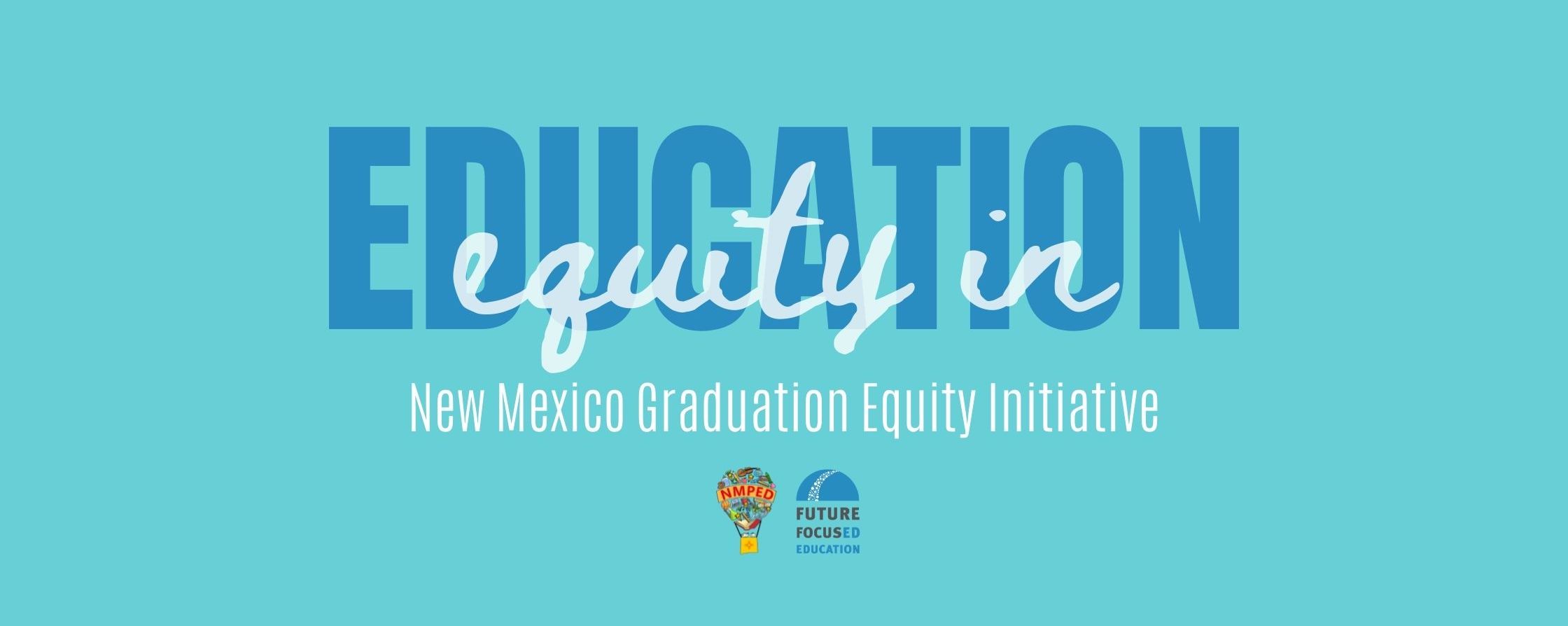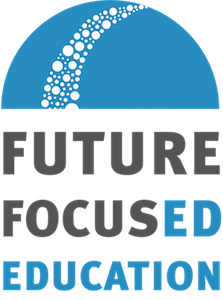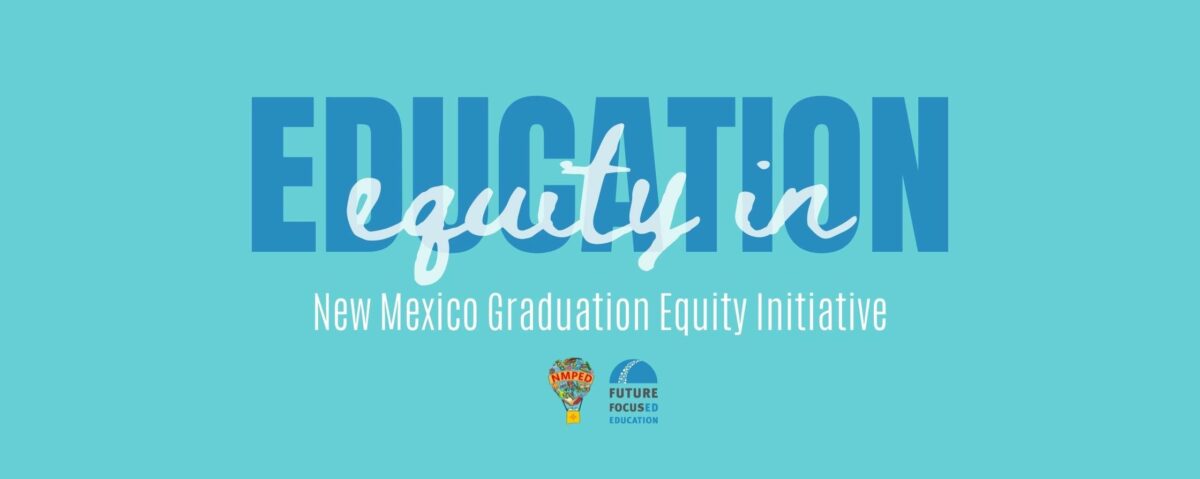What is the New Mexico Graduation Equity Initiative?

Our state is searching for new answers to help our schools better serve young people and their communities.
Three years ago, the Yazzie/Martinez lawsuit ruled that all New Mexican students have a right to be college and career ready and that the Public Education Department was not meeting this obligation to its students.
Since then, a combination of a new administration in Santa Fe, calls for racial justice, and COVID-19 has left a void that used to be filled by standardized testing. Accountability as a theory of change has not survived the political shifts, and we have learned just how irrelevant those measurements are because of the pandemic.
Future Focused Education and the Public Education Department have partnered on an answer to this problem: the New Mexico Graduation Equity Initiative (NMGEI). This initiative is working to fundamentally change our assessment system in favor of anti-racist, equitable, community-centered capstone projects as an alternative to standardized testing.
Senior capstone projects will be a new pathway to graduation across the state. This is a radical departure from the top down centralized accountability system that asked students to check their identity at the door. The initiative has terrific potential for community, youth, and teacher development.
Here are more details about this exciting movement:
What is the goal of the New Mexico Graduation Equity Initiative (NMGEI)?
The goal of the New Mexico Graduation Equity Initiative (NMGEI) is to address the education system’s history of structural and inherent racism.
Why is NMGEI needed?
New Mexico’s high school students need a more expansive learning and assessment system that honors their cultural and linguistic strengths while providing feedback and other engaging opportunities—allowing students to take ownership of their learning, build strong identities, and see a rich future ahead.
Testimony from New Mexican educational experts heard during the Yazzie/Martinez lawsuit made clear the inequities that pervade our school system. To illustrate this inequity—specifically among students who are low-income, bilingual, and receiving special education services—the ruling pointed to low graduation rates and even lower proficiency scores in reading and math on standardized assessments.
What’s the problem with standardized tests?
It is well-documented that standardized assessments are inherently biased (Rosales & Walker, 2021), especially given that their inception is founded in the eugenics movement (Gates, 2019). While the SAT and other standardized assessments have admittedly undergone significant changes over the years, these metrics are fundamentally flawed and were intended to prove that white supremacy culture and values were superior to the language, culture, and knowledge that are essential to New Mexican families and communities.
While state bubble-test data has been useful to policymakers, it has been virtually meaningless to communities, students, and teachers. The results come in too late for teachers to make them actionable, and they do not provide the personalized feedback a student needs to fuel their growth.
Instead the data becomes a judgment of an educator’s teaching skill or their school’s effectiveness. But test scores are a limited and largely invalid measure of both teachers and schools because they focus exclusively on academics and omit the context and culture of students’ lived experiences, and they give schools and teachers no information about how to improve or grow.
Similarly, summing up students by a number or score devalues who they are. Even for strong students who score high, reducing their merits to a number can restrict their development, making it hard to understand who they are in a holistic way. It can be deeply detrimental if it’s a low score, as it becomes a statement of worth, sorting students against other classmates.
Read more: How Do Students Really Feel About Standardized Tests? Youth Interns Survey Peers to Find Out
What is NMGEI doing?
Together with the New Mexico Public Education Department we are defining and piloting a new project-based graduation pathway that culminates with senior exhibitions to demonstrate learning, as an alternative to graduation options that require traditional testing.
Current actions include...
- Facilitating the Innovative Assessment Community of Practice
- Facilitating the Educator Community of Practice for Capstone Assessments
- Holding Youth Participatory Action Research groups
- Supporting Equity Council initiatives
- Piloting alternative assessments and new graduation pathways
What is a capstone project?
A capstone is a months-long project rooted in authentic contexts and building on local assets and culture. Students engage in active, self-directed, and community-based learning experiences to produce a body of work.
Capstones result in public exhibitions of learning to school, family, and community.
Read more about what a capstone project looks like at…
- Siembra Leadership High School, Albuquerque: Business Commercial Competition capstone
- Picacho Middle School, Las Cruces: El Camino Real, A Journey of History and Culture: A Mural Project capstone
- Health Leadership High School, Albuquerque: Community Wellness Practicum capstones
What is a graduate profile?
A graduate profile outlines the knowledge, skills, and dispositions that the local community identifies as important for graduates to have when they exit high school.
A graduate profile often includes competencies beyond traditional academics, including employability and social-emotional skills that honor students’ cultural and linguistic identities.
- How to Fulfill the Promise of Graduate Profiles
- Senior Capstones are Replacing Bubble Tests at Some High Schools: How This Will Change Our Education System
How do capstone assessments address racism?
A graduation capstone assessment is an opportunity for New Mexican students to demonstrate what they know and what they can do in a way that is meaningful to their community.
This assessment is for all students, not only the students who may not immediately meet the expectations of standardized assessments. In this way, the capstone is not an “alternative” assessment, as it is often dubbed, but is instead an equivalent to standardized assessments. This is an important step forward for New Mexican schools and valuing students’ lived experiences.
By promoting community engagement in the development of graduate profiles and capstone projects statewide, Future Focused and NMPED are changing high school graduation assessments to honor the ethnic and linguistic diversity in the state. In graduate profiles, diverse stakeholders shape how our schools define student success, building a fuller picture than a “success equals this score or above” definition. In capstone projects, community partners help our educators and young people apply learning in real, local, and culturally responsive contexts.
In order for New Mexico’s capstone assessments to truly honor students’ language and culture, we recognize that each capstone must be defined by each community across the state—while meeting rigorous expectations defined by the Public Education Department.
Read more:
- How to Make Senior Capstones Truly Anti-Racist: Alternative Assessments Are Not Inherently Equitable Without Concerted Effort
- How New Mexico is Working to Decolonize Curriculum
How will NMGEI impact the broader education system?
Capstone projects and graduate profiles will have a backwards impact all the way to early childhood education. If we’re preparing students for a senior year experience that isn’t a bubble test, but an active learning experience and exploration of personal journey, that changes the finish line. How might that affect a first grader? A fifth grader? In order to prepare students for a more full expression of skills and competencies, teachers and students will have to adjust curriculum and activities from day one.
How can my school or district get involved?
The New Mexico Innovative Assessment Community of Practice (CoP) convenes educators and districts around the state who are interested in piloting new graduation options and alternative assessments.
Participants in the Community of Practice ask their local communities what student success should look like, design capstone projects that honor who students are, and develop guidelines to support others statewide in developing their own high-quality graduate profiles and capstone programs for seniors.
JOIN THE COMMUNITY OF PRACTICE



Comments
Pingback: Why Local and National Education Leaders Reject Standardized Testing - Future Focused Education